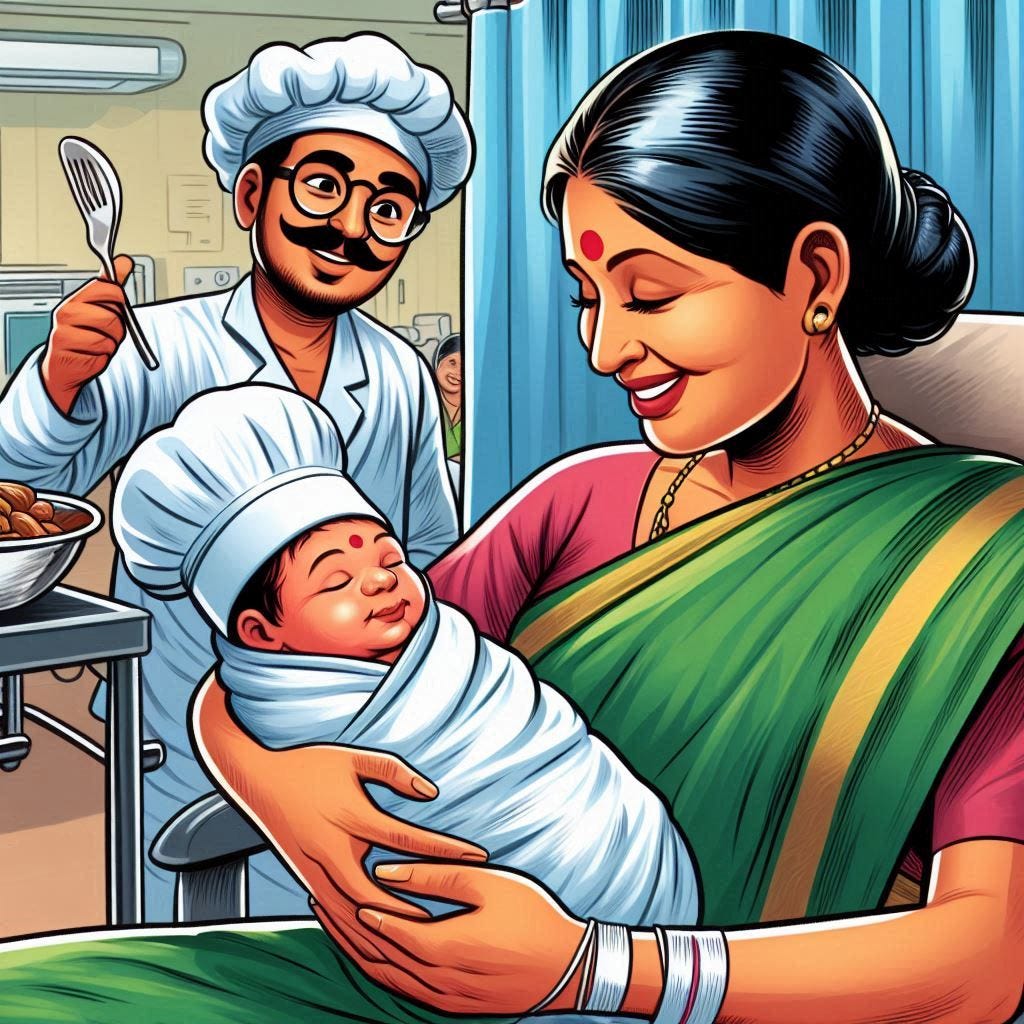project announcement: grandma's recipe book
i'll translate and analyze a handwritten book of recipes from my Punjabi grandma
Last year my grandma gave me the best birthday gift I’ve ever received: a handwritten notebook of her recipes. She made it just for me. It’s 80+ pages of straight content, just recipe after recipe, all her classic hits and a bunch of rare deep cuts. She’s widely acknowledged as the best chef in our extended family and her social circle in Jaipur, so this is a Very Big Deal. So far I haven’t done much with it except cook something occasionally, but I’ve been thinking and I finally know what to do. I’m ready.

what is the project, what will you do exactly
The recipes are in Hindi and they’re in a physical paper notebook right now. For each recipe I’ll transcribe and translate it. Then I’ll do a less literal translation into modern recipe form with steps, total time, active time, difficulty rating, cleanup/mess/single-pot-cookability rating, exact quantities, helpful stuff like that. Then I’ll write notes explaining the techniques and science tricks she’s using. I’ll look for variations of the dish in some published cookbooks and do a little *ahem* comparative analysis. First I’ll cook it exactly as written, trying my best to source authentic ingredients (not sure where to find teetar though). Then I’ll cook and write up an adapted version using ingredients that are easily available in Brooklyn 2024.
I’m making a spreadsheet of all the recipes and the ingredients in each one. This will make it easy to ask questions like, “What does nani use cardamom for, usually? Is it meat dishes? Desserts?” Or, “When nani uses cardamom, what else does she use? What does she never mix with cardamom?”
Using this dataset I’ll write posts explaining how the great woman seems to think: what techniques she applies to what kinds of dishes, what spice combinations she uses and when, and what themes seem to recur.

what does this have to do with improvisational cooking?
Ok cool project but why does it belong on this blog? Improvisation is built on knowing a lot of successful ideas: fragments of recipes, ways of treating ingredients, tricks for fixing disasters. Here I have a big corpus of recipes from a sublime master of the craft. I smell opportunity. I’m going in there looking for ideas to steal and then I’ll write those up so we can all use them.
Also, adaptation is a form of improvisation. The adaptations will be useful training data, er, I mean, examples, for people trying to adapt their own family recipes to wherever they live.
why are you doing this project?
Obviously this is a love letter to my nani and her cooking. And of course I’m salivating at the prospect of cooking my way through her recipes and then testing my Brooklynized variations. And no one can deny that I will thoroughly enjoy larping as a humanities scholar as I compare variations across multiple primary sources.

But above all else, I prize results. I want to make delicious Indian food using the best ingredients I have available to me, but the best stuff at my farmers market isn’t common in India. That means I cannot simply memorize recipes. I’ve got to understand how good Indian food works, and then weaponize that understanding into novel recipes using great American produce. This project will help me build that understanding, in public, and share it with the world.
My nani has many strengths as a cook, but the one I esteem most highly is her ruthless simplicity. Ingredients lists as short as a William Carlos Williams poem. How does she do that? I must know. That’s why I’m doing this project, and that’s why I’m doing the part where I compare her recipes to variations found in published cookbooks. Is she really using fewer things or steps? What did she cut? Why did that still work? I must know.
what makes this work novel?
Wait no I’m not writing a grant proposal. The work doesn’t have to be novel. But I claim that it is! Allow me to explain.
This is a coherent collection of recipes from a single, practicing, extremely high tier home cook. All these dishes go together and make sense. I know because I’ve eaten them. Cookbook shelves are of course full of works that match that description, but rarely are they annotated with food science and regional variations, at least not in the Indian section. This is going to be the Norton Critical Edition of Punjabi Home Cooking.
The other novel thing is the ingredients x recipes spreadsheet data. I don’t know how useful that’ll be but I’ve always wanted to make it. Now I have a vetted dataset of recipes so I’m going to do it.
what reference works and cookbooks are you planning to use?
For food science, Harold McGee’s On Food and Cooking. I’ve had my copy for over 10 years and I’ve learned a ton from it. Any time I hear about a new ingredient, or if something weird happens, I look it up in the big red book and there’s a good chance my boy Harold got me covered.
Pushpesh Pant’s India: The Cookbook is my favorite reference when I just want to see some variations on a dish. As a thicc Punjabi boi who grew up in Delhi, this book feels the most regionally neutral to me. But it’s possible that to cooks from other parts of India it has a Delhi or Punjabi flavor. Shrug emoji.
Yamuna Devi’s Lord Krishna’s Cuisine is nearly as comprehensive as the Pushpesh Pant, but it only has vegetarian dishes and leans distinctly Bengali.
Dassana Amit’s vegrecipesofindia is pretty reliable, and to me it feels somewhat Punjabi or perhaps an offshoot of Punjabi that’s settled in Delhi. But I’m not sure.
I might occasionally refer to books by Julie Sahni, Madhur Jaffrey, Tarla Dalal and Sanjeev Kapoor. I don’t have a Punjabi home cookbook that I like very much but I’m actively trying a few and will recommend one if I find it. That would be the most appropriate point of comparison for my nani’s cooking.




I love this project!
so cool!!!!!